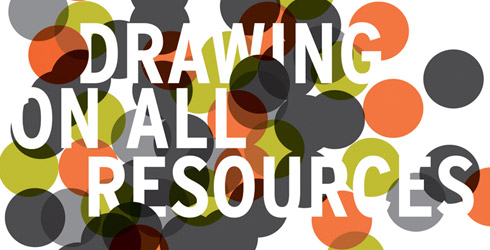Reports from Drawing on All Resources

Discussion Groups
As part of the range of parallel sessions which were conducted throughout the day, three discussion groups took place with the aim of delegates sharing views around particular themes pertinent to open educational resources and practices.
The Best Use of Infinity? (Session 3)
Discussion led by Christoph Raatz, Council for Higher Education in Art and Design (CHEAD)
The Best Use of Infinity’, by Alan Clarke, (Networks Magazine, available at: http://www.adm.heacademy.ac.uk/resources/features/the-best-use-of-infinity-open-educational-resources-and-the-politics-of-knowledge/), was used as a trigger paper for the discussion led by CHEAD’s Christoph Raatz. The key assumptions and themes for higher education were presented including: ‘ethical responsibility’; ‘ways of learning’, from atomised to organic; the current ‘point of change’ in the public domain; and ‘shared assumptions’ of the benefits of open education. In addition, these themes were extrapolated to present underlying questions: whether universities demonstrated they were for the common good; what could be seen as underlying issues for the art, design and media sector; whether intellectual property and copyright were obstacles to open education; and what were the possible motivations for staff, particularly in the context of employment insecurity and expanding workload.
The group gave consideration to increased expectations by students in the context of a changing funding environment and there was acknowledgement of changing working relationships in higher education and the growing marketisation of the university sector. The volume of material that can be made available to staff and students in the public domain problematises open education with regard to access and use of legitimately licensed materials, although there was recognition of a very well established culture of distance learning in the creative arts that has been in place for over a hundred years.
Process.arts: open participatory education (Session 6)
Workshop led by Chris Follows, University of the Arts London
The first afternoon session, conducted by Chris Follows, took the form of a workshop demonstration outlining the history, development and functionality of the process arts website (http://process.arts.ac.uk/), which describes itself as: ‘an open online resource sharing day-to-day arts practice and research of art, design and media, staff, students, alumni and practitioners’.
Independent of any single institution the site, although supported through UAL infrastructure, encourages dialogue, sharing, and voluntary participation. The site is not exclusive, encouraging engagement with businesses, and seeks to cluster around themes and interests rather than individual courses.
A full recording of the session is available at: http://process.arts.ac.uk/content/case-study-oep-processarts-ual
The Question of Quality (Session 9)
Discussion led by David Mathew, University of Bedfordshire
The final discussion of the day centred on issues of quality assurance, maintenance and resource suitability. A very open session, it acknowledged that this was not a concern limited to open education but pertinent to all resource creation and use on HE courses. Open educational resources which sought wider, supplementary use, remixing and sharing were inherently difficult to police for quality assurance. Currency and relevance were acknowledged but it was also important that resources should provide an opportunity for students, and staff, to develop critical engagement, critical literacy skills and a strategy to develop effective research skills.
Additional concerns were raised around attribution, appropriate referencing, and the wider issue of plagiarism that could become complex when considering the use of sound and image in creative disciplines.
Full abstracts and biographies of the sessions above
Stephen Mallinder
University of Brighton
_______________________________________________________________________
Reports
The Drawing on All Resources event was enjoyable and informative, and its title was apt for a host of reasons. More than is the case with many conferences, I got the impression that despite the fact that OER have been with us for some time now, we were embarking on a new work chapter together. It was good to hear so many different opinions on the subject, and the fact that I remain ambivalent about OER is no reflection on the day or on any one presentation or presenter. In fact, in an almost perverse way, it is useful not to solve all the problems (even if it were feasible to do so): the challenge to one's mind and one's perception is a useful outcome by itself. Certainly I drew on the resources of a crowd of friendly delegates, who even made me forget for a while that I was ill with an unpleasant bug!
When I was first invited to chair a discussion at this conference (see above - The Question of Quality), my first thought was to suggest something about quality and quality control. I had noticed that the quality of resources, when these resources were chosen at random, was extremely variable. I brought my thoughts to the conference and I was happy to see and engage with a healthy audience with similar thoughts, opinions at odds with my own, and with individual, specific concerns. This was all to the good. One member of the group, prompted by my anecdote of choosing three at random (on the subject of psychoanalysis) and finding one good, one blurry, and one factually incorrect, mentioned that my own opinions should not constitute 'the truth'. She put it politely and I took the point: when it comes to arts subjects, perhaps (just perhaps!) there can be more leeway about what we think of as true... which in turn, of course, makes the subject of quality even more difficult to nail down.
I am glad for the chance to have taken part in the debate. If I had been at the conference as a delegate and not as a chair, I think I would have chosen a similar session to attend to the one that I actually presented, if the subject was available. Quality remains a chewy subject and there are no quick fixes. If (somehow) a body could be made responsible for the maintenance of quality, something else would have to give: quite possibly we would have gained one goal at the expense of something else. After all, any professional would have to come from somewhere; a role would have to have been created.
The debate continues...
David Mathew
Centre for Learning Excellence, University of Bedfordshire
_______________________________________________________________________
As I was giving two presentations (one for a colleague that could not attend) another attendee quipped that I was the James Brown of the arts OER scene that day – for younger readers James Brown, the famous blues singer, had a tag line as being known as the 'hardest working man in show business'. I liked the comparison a lot so thought I would share it.
The event was enjoyable, interesting and useful. The first keynote about moving image archives by Paul Gerhardt from ‘Archives for Creativity’ was fascinating and seeing how archives could be reused in new art was quite inspiring. I gave my first presentation which was a generic one about how OER engagement might be used as a driver for change and examined some of the factors this involved including some of the political agendas involved. After that I went to attend the last half of a discussion led by Christoph Raatz from CHEAD about the ‘politics of knowledge’ – that was really interesting and we could have gone all day! After a nice lunch and natter with attendees and colleagues it was on to my second presentation about 'Collaborative Approaches to Learning Design' that looked at the pedagogical and technical issues related to designing OERs and our use of a format we call ‘Open CourseBooks’ that mixes Open Text Books with OpenCourseWare. After that I went along to a fascinating discussion about Quality in OERs where we also discussed legal issues. Then, after a quick catch up with a few folk, I headed off to the pub for a couple of well-earned pints before getting the train back to London.
All in all a great day and it was good to see so many arts educationalists at an OER event as we are often a very small minority in the OER scene. I would vote for making it an annual event.
John Casey
University of the Arts London
_______________________________________________________________________
This conference was extremely informative for the team at Northbrook College who are very interested in OERs, collaboration, the sharing of ideas, as well as building relationships within the community.
Being in the midst of a live JISC-funded OER project, this conference enabled us not only to disseminate our project’s aims and objectives, it gave our project a voice. It also allowed the involvement of students and team members to share experiences with other conference members and institutions that are using OERs to enhance their own practice.
When we first began our journey on the road to the OER community, we had little knowledge as to what OERs were, their uses and how we could inform others of their uses.
I was encouraged that other institutions had experienced highs and lows in the processes of producing their OER projects, and their efforts in dealing with the on-demand expectations of digital literacy and methods of delivery.
It was interesting to see how other delegates of the conference had set up their projects and the tools and methods they had used to promote them, especially using established social networks to reach the widest audiences.
Our project focuses on encouraging PCGE students to not only use OERs in their every day teaching practices, but also to develop their own OERs that can be licensed and redistributed for others to reappropriate. Their participation in the conference has allowed them to see first-hand how other organisations have embraced Open Educational Resources and are actively using them in their educational practice.
CJ Taylor
Northbrook College Sussex
At the end of the event, some of the presenters were available to 'show and tell' their resources. CJ and her colleague, Helen Waddington, demonstrated the Northbrook College OER Project, Stream Northbrook (Streaming Server Project).
The aim of the project was to investigate and develop knowledge and practice in using electronic based resources in line with new technologies and explore future possibilities for Northbrook students and staff. This project investigates how to develop resources for learning as technology, accessibility and demand evolve.
The college is currently exploring the possibilities of setting up a streaming server to enable wider access to a variety of resources in electronic format. These include Off–Air Broadcasts, podcasts, music files, RSS feeds, a resource database, webcasts and video casts and other resources previously held in text or slide format. Looking particularly at online material and resources used in other institutions and how this is accessed.
The project will generate an opportunity to share knowledge of existing practices in the college, look at what we could be doing to enable resource accessibility and develop exciting formats for learners and staff to use in this environment.
http://stream.northbrook.ac.uk/oer/#
_______________________________________________________________________
We have collated some comments and ideas shared by delegates after the event which you might find useful: Feedback from delegates at Drawing on All Resources
Header image: Section of logo for Drawing on All Resources, designed by compoundEye


